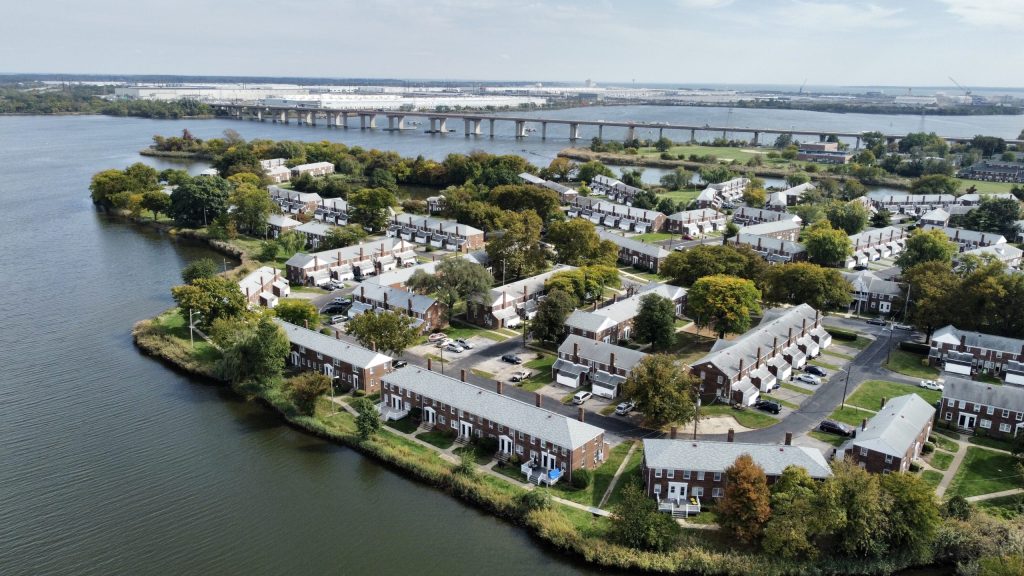By Tashi McQueen
AFRO Staff Writer
tmcqueen@afro.com
Residents of Turner Station, an historic Black neighborhood in Baltimore County, Md., are voicing concern for their homes ahead of construction to rebuild the Francis Scott Key Bridge.
“We’re very close to the bridge,” said Mary Branch, board member of the Turner Station Conservation Team. “When they were demolishing certain structures that were under the water that impacted us.”
The Francis Scott Key Bridge collapsed in the early morning of March 26, 2024, after the cargo ship Dali crashed into it. José Mynor López, Alejandro Hernandez Fuentes, Dorlian Ronial Castillo Cabrera, Maynor Yasir Suazo-Sandoval, Carlos Daniel Hernandez Estrella and Miguel Angel Luna Gonzalez were working on the bridge at the time of the crash and died.
Maryland’s federal partners secured 100 percent of the funding needed to rebuild the bridge at the end of the 118th U.S. Congress. Former President Joe Biden (D) signed the bill into law on Dec. 21, 2024.

According to the Maryland Transit Authority (MDTA), pre-construction initiatives for the Key Bridge began on Jan. 8, and the bridge is expected to be reopened by fall 2028. In a recent press conference, Maryland Gov. Wes Moore (D) and Lt. Gov. Aruna Miller (D) said demolition for the remaining sections of the bridge is set to begin this spring, and construction will begin immediately afterward.
Gloria Nelson, president of the Turner Station Conservation Team, spoke of the impact of the bridge collapse on the community.
“Because of the increase of traffic, to get from Turner Station to Glen Burnie or parts of Anne Arundel County, Md., our commute has increased from 15 minutes to 30 to 45 minutes,” she said. “You’re talking about dealing with idle trucks, because they’re in traffic and emissions [are] affecting the air quality.”
Residents shared that the bridge acted as a shortcut for many residents to get where they needed to go around Baltimore and stay connected to their churches, families and friends.
“There is a sense of isolation,” said Nelson. “Family members are not visiting as much. That friendship network that would go back and forth is doing it less. They can’t afford the gas. It’s costing them more gas.”
This compounded on top of the issues they’ve already been facing as they aim to keep their historic Black neighborhood alive makes for a challenge ahead.
Turner Station is located in Dundalk, centered on Sollers Point Road, and neighboring the Key Bridge. It has existed since the late 1800s when Black families started building homes near a steel mill, which employed many of the residents. It was also, at one time, the largest Black enclave in Baltimore County.
One longtime resident of Turner Station, Joy Harvey, said her family worked at the steel mill.
“My father’s father originally was from North Carolina,” said Harvey, 58. “Because of the Bethlehem Steel mill, they came here to work to provide for their family. My dad worked there, my uncle worked there.”
Nelson spoke of how the community thrived, particularly in the 1970s and 1980s.
“We had over 10,000 residents at that time and things were good,” said Nelson. “We had convenience stores, a barber, a theater, cab stands, a post office, doctors, schools–you name it.”
But then, things shifted for the community.
“Over the years, as industries dissolved and moved out, so did the community,” said Nelson. “The community has declined, and we’re down to around 3,000 residents.”
As they worked to hold on to their community and preserve its rich African-American history, the bridge collapse added another layer to their fight.
As explosives are expected to be used in the construction process Nelson said “residents are very concerned about what all of this would do to the structure of their homes and even the buildings.”
Even though they are experiencing these adverse effects, Nelson said state and local partners have been on the ground with the community since the collapse.
“They had several public hearings and shared with us their process–how they were going to do it…the time frame,” said Nelson.
MDTA spoke with the AFRO, further detailing what the rebuild process will look like.
“Starting in January 2025, the MDTA’s progressive design-build team will begin pre-construction property inspections to approximately 1,100 homes and businesses in the adjacent communities of the Key Bridge Rebuild project area,” Bradley Turner, the director of the Office of Communications and Marketing for MDTA, told the AFRO. “While the MDTA does not typically conduct pre-construction property inspections on all projects, we are committed to addressing the concerns expressed by community members for potential basement and foundation damage.”
“Although the MDTA’s engineering analysis ensured that construction would not cause damage to properties, out of an abundance of caution, the MDTA is providing pre-construction property inspections,” continued Turner.
He further explained that “these inspections are beneficial for everyone involved—the homeowner, MDTA, and the contractor—by establishing a clear record of the home’s interior and exterior conditions before any construction begins.”
Turner said the inspections are optional and free for the homeowner. Inspections are expected to be completed by the end of February.
“Letters were mailed to residents with properties within 1 mile of the rebuild and residents can schedule the property inspections at their convenience,” said Turner. “The MDTA has participated in Turner Station community meetings, other events and will continue to do so to engage with residents.”
The post Turner Station residents voice concern over potential impact of Key Bridge re-construction appeared first on AFRO American Newspapers.











